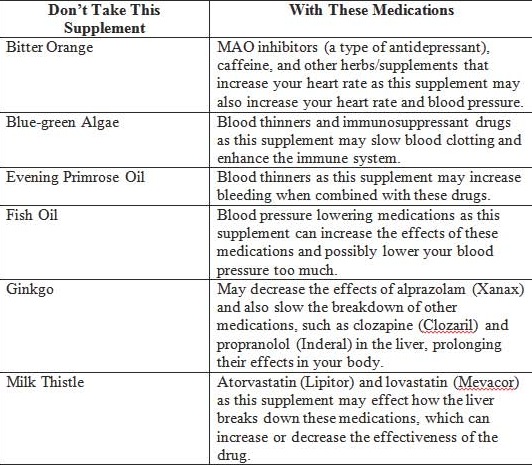Guest post by Nicole N. Ferm DTR/L, Courtesy of the Maine Academy of Nutrition and Dietetics

jarmoluk / Pixabay
Did you know that an estimated 72 million people in the United States take some form of dietary supplement along with their prescription medications?
You might not think it’s a big deal, but surprisingly, even the most common supplements, like a multivitamin, can cause problems or be dangerous when taken alongside certain prescription or over-the-counter medications.
What kinds of supplements are we talking about?
First off, since lots of people don’t use the term “dietary supplement” in their daily conversations (and instead may just use the phrase “vitamin pill,” etc) it might help to know what is considered a supplement.
According to the Food and Drug Administration, dietary supplements include:
- vitamins
- mineral products
- enzyme supplements
- amino acid supplements.
What about supplements that are “natural”?
Well, the word “natural” does not automatically mean “safe.” Even herbal and/or botanical supplements can pose problems.
In fact, products that advertise themselves as “all-natural” can be even riskier because their interactions with medications may be unknown.
The FDA has some oversight in the dietary supplement industry, but it’s not the same set of regulations they use for food and conventional drug products.
The agency ensures that the products are safe and nontoxic, but they do not regulate the efficacy of the supplements (the way they do for conventional prescription and over-the-counter medications). In addition, the FDA only regulates the supplements for safety when used alone — not in combination with medicines — and not in all possible doses.
What kinds of problems can result from mixing meds and supplements?
There are many different supplements and many different medications. As you can imagine, the combinations are numerous. Here are a couple of the more common examples:
Here are a couple of the more common examples:
- St. John’s Wort interacts with medications for HIV/AIDS, heart disease, depression, organ transplants, and birth control pills, rendering them less effective in some cases and even life-threatening in others.
- Gingko Biloba and vitamin E supplements (both of which thin the blood) interact with Coumadin/Warfarin (prescription blood thinners), increasing your risk for stroke.
To check on a specific supplement and its potential medication interactions check out the National Institute of Health website.
What about foods and medications?
Certain foods are known to have interactions with various medications. Some of the more common culprits are citrus juices (especially grapefruit), natural black licorice and foods high in vitamin K (such as leafy greens). Alcohol is frequently a no-no when you’re also taking medication—check the label.
Protect yourself
How to protect yourself from medication interactions:
- Tell all your health providers which medications you are on and also which dietary supplements you take.
- Make it easy on yourself and bring a list of all medications and supplements (including dosages and frequency of use) to your doctor appointments (dentists also need to know this information). Or, you could put all your medications and supplements into a zip-top plastic bag and take it with you to your appointment.
- Call your doctor’s office before taking OTC herbal supplements/dietary supplements to make sure it’s ok for you. The doctor should know what medications you are on, but if he/she doesn’t, be sure to provide an update.
- Alert your physician if your health status has changed: pregnancy, breastfeeding, any recent illness or surgery. Your dentist will want to know these things as well.
- Read the informational inserts that come with your medications, paying special attention to the section on medication interactions.
Here’s a handy chart that shows some possible interactions.
Thank you for reading Nicole’s post about the dangers of mixing supplements and medications. It contains valuable information so make sure to share it with your friends. (You’ll find handy share buttons at the end of the post.) What about you? Have you ever had a bad reaction from mixing a supplement with a medication?


Leave A Comment